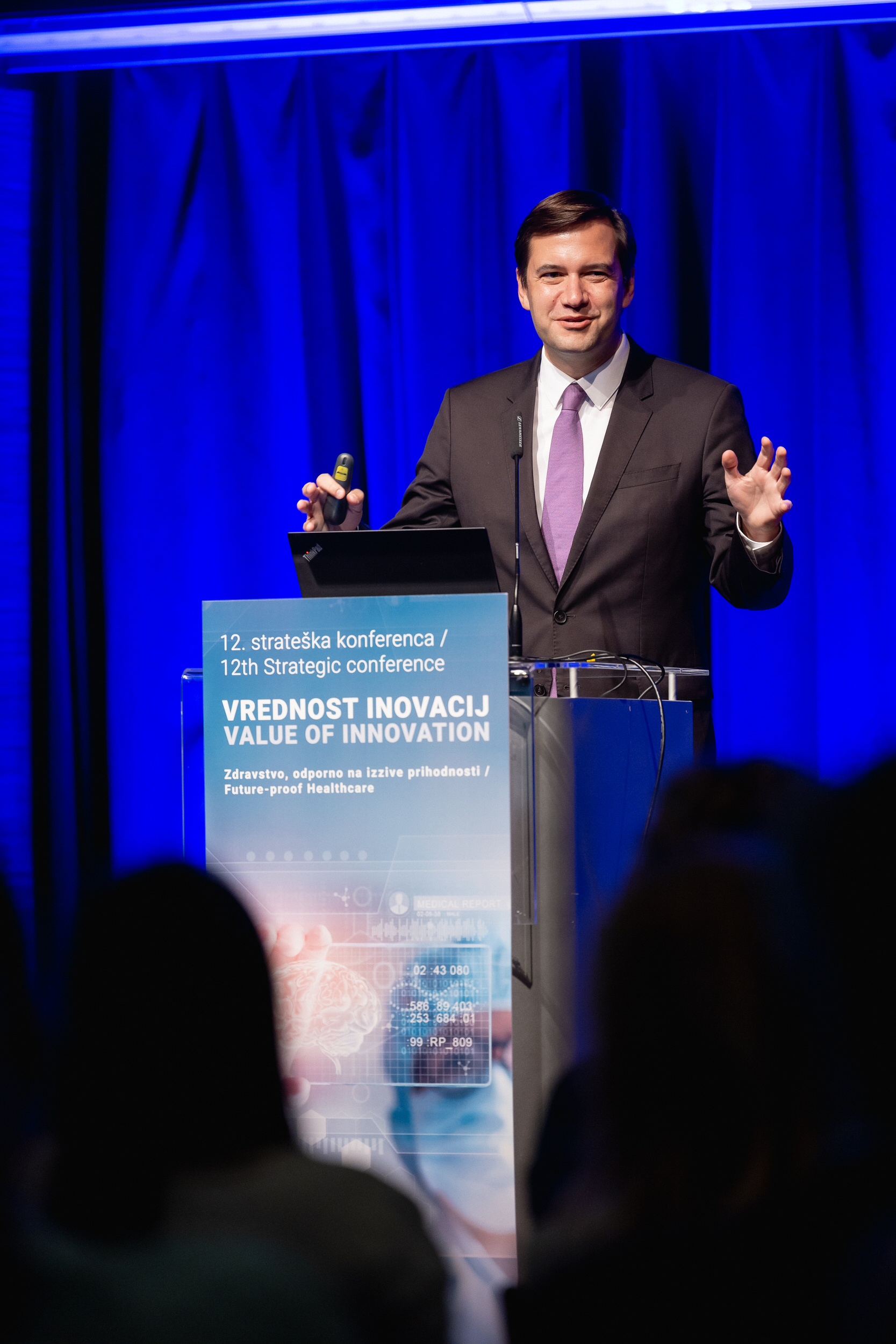How to adapt the healthcare system to be future-proof (Guest Blog)
How to ensure that our healthcare system will be prepared for the future, i.e. flexible, responsive and able to adapt to future needs?
Ljubljana, 30 May 2023 - How to ensure that our healthcare system will be prepared for the future, i.e. flexible, responsive and able to adapt to future needs? As we live in a time of global health, economic, and social crises, the concept of crisis-resilient healthcare is becoming imperative. We already have to adapt healthcare, and we can do this in several different ways. Some of these were presented by foreign and domestic speakers at the 12th Strategic conference Value of Innovation, which this year was held under the theme "Future-proof Healthcare".
As Domen Groznik, board member of the Forum of International Research and Development Pharmaceutical Companies, EIG, said in his opening address, we can achieve this goal by integrating state-of-the-art technologies and collaborative models of care. This way, we would be stepping towards a future in which artificial intelligence and genomic research would help doctors in their decisions, enabling accurate diagnostics and tailoring treatment to the individual. The director of Health at Copenhagen Institute for Future Studies, Bogi Eliasen, agreed, adding that recently researchers are focusing mainly on the duration of a healthy life span and not just the entire life span of an individual, and on health care that focuses on patients. According to him, prevention is gaining importance: "We must focus our work on connecting different aspects of health and healthcare between different countries. Today's discussion focuses on improving healthcare. It is important to realize that we have already come a long way here. We must do the right things in the right way. There is no single answer, but there are choices." He further emphasized that knowledge and experience relate to the past, and decisions to the future. We must understand that investing in healthcare is an investment and not an expense. "It is important to ensure that people are as healthy as possible for as long as possible. A healthier population is key to sustainable healthcare."
Ricardo Baptista Leite, MP MD, CEO of IDAIR, the International Digital Health and Artificial Intelligence Research Collaborative in Geneva, firstly talked about the Portuguese health system, which ranked among the 15 best in the world. As he said, this was achieved by investing primarily in the quality of education. However, like other countries, they face demographic challenges. In 2080, the share of the active population in Portugal will be smaller than the share of people over 65 years of age. "We have a pension system in which the active population pays social security and the older population then receives it back in the form of a pension. This creates the challenge of a disparity that increases with time and the aging of the population. Things are a bit better here in Slovenia, but you too will face similar challenges in the future," he said, adding that health care is the foundation of our system, in which we need to invest more.

"We need to reduce the burden of disease. We must ensure that preventable diseases are prevented and curable diseases are cured." According to him, healthcare must adapt and learn to use new tools. We need to focus on patients and leave administrative work to digital devices. "We need to ensure the best access to care. Prevention and people's well-being must be the goal of everything we do."
Eric Sutherland, Leader of Digital Health at the OECD, said that we need systems that are cost-effective and sustainable, scalable in different locations and for different people, responsive to changes and with low risk and better outcomes: "The purpose of innovation is to improve and optimize treatment results. An integrated digital health ecosystem brings better results, as such a system is cost-effective, responsive and flexible. We achieve this through predictable and flexible processes and the use of data. The key barriers to innovation are thus not technical, but stem from mistrust, resistance to change and fragmentation of systems. All of this can be successfully addressed through cooperation, good management and interoperable systems." According to him, we need to be focused on what we want to improve, what data we need to collect and how to connect the key systems. This way we can turn data into information, insights, and relevant actions. And when we do that over and over and actively use the things we have already done, we can create a better health ecosystem.
The conference also featured a round table entitled "Slovenia as part of a flexible, sustainable and future-ready European Union", moderated by Assoc. Prof Dr Petra Došenović Bonča, Head of the Department of Economics at the Faculty of Economics of the University of Ljubljana. Tanja Španić, President of the Association Europa Donna Slovenia and President of the European Association for Breast Cancer - Europa Donna, said that patients to often become just a diagnosis, a code, and that it is necessary to treat the person as a whole: "We are moving towards this, we have also examples of good practices in Slovenia. The changes are most seen in rare diseases. We have to start somewhere and go step by step with what we currently have. We are all users, today me, tomorrow you. Until you get sick, you don't know what the health system is and what it offers." Cf. MSc Dorijan Marušič, international healthcare Adviser, said that we have now realized that there is not such a big gap between Slovenia and the international space: "We need to start changing words, communication, invest in health, stimulate citizens and adapt to their way of thinking about health. Slovenians are the worst in terms of satisfaction with their health, even though we are comparatively and realistically quite a healthy population. The patient must become an equal partner in the treatment process, we must focus on him and start measuring results."
Metka Zaletel, Head of the Health Data Center of the National Institute of Public Health (NIJZ), agreed, as she mentioned that Slovenia is currently in the phase of the new digitization law, so it is difficult to predict what the future will be like. "There is a lot of data in Slovenia; currently there are still – as in other countries – information gaps when we cannot yet meet some data needs, but these gaps are relatively small and in most cases they can be replaced by estimates based on other countries' models. The dilemmas we face on a daily basis, which are related to data quality, data availability and methodological comparability of data, are mostly solvable, but only with the cooperation of all stakeholders and data users. The European Health Data Area (EHDS) will not resolve these dilemmas, but will help to increase the use and utilization of the research power of Slovenian data," she added. Mircha Poldrugovac, from the NIJZ Center for Health Care, added that we often expect the community to take care of us, but we must encourage everyone to also take on the weight of responsibility. The key is for each of us to ask ourselves what we can do as individuals within our community to improve the situation. "Only in this way we will recognize that mutual trust and co-responsibility for the entire system are necessary for the successful and efficient introduction of changes in the healthcare system." Simon Rekanović, MP MD, also noted how healthcare is an evolution, a process of change that takes place with the help of the technology available. According to him, we should be less concerned with the fact that we are in the process of digitization or innovation, but actually ask ourselves what we can do - and do it.

Wrapping up, Assoc. Prof Dr Došenović Bonča said: "We were looking for answers to the questions of what we need in order to prepare our health system for future challenges. We have shown that financial sustainability is only a basic condition and that the key is to ensure an adequate number of highly competent and committed employees in healthcare and in all supporting and regulatory organizations. The healthcare strategy is by definition stakeholder-based and as such requires partnership, trust and constructive cooperation, because without this it is not possible to ensure a flexible healthcare system that responds quickly to the needs of patients and the healthcare challenges of the entire society."
The full event is available to watch here.
